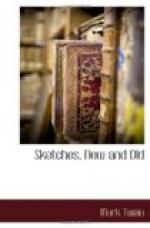A CURIOUS DREAM
CONTAINING A MORAL
Night before last I had a singular dream. I seemed to be sitting on a doorstep (in no particular city perhaps) ruminating, and the time of night appeared to be about twelve or one o’clock. The weather was balmy and delicious. There was no human sound in the air, not even a footstep. There was no sound of any kind to emphasize the dead stillness, except the occasional hollow barking of a dog in the distance and the fainter answer of a further dog. Presently up the street I heard a bony clack-clacking, and guessed it was the castanets of a serenading party. In a minute more a tall skeleton, hooded, and half clad in a tattered and moldy shroud, whose shreds were flapping about the ribby latticework of its person, swung by me with a stately stride and disappeared in the gray gloom of the starlight. It had a broken and worm-eaten coffin on its shoulder and a bundle of something in its hand. I knew what the clack-clacking was then; it was this party’s joints working together, and his elbows knocking against his sides as he walked. I may say I was surprised. Before I could collect my thoughts and enter upon any speculations as to what this apparition might portend, I heard another one coming for I recognized his clack-clack. He had two-thirds of a coffin on his shoulder, and some foot and head boards under his arm. I mightily wanted, to peer under his hood and speak to him, but when he turned and smiled upon me with his cavernous sockets and his projecting grin as he went by, I thought I would not detain him. He was hardly gone when I heard the clacking again, and another one issued from the shadowy half-light. This one was bending under a heavy gravestone, and dragging a shabby coffin after him by a string. When he got to me he gave me a steady look for a moment or two, and then rounded to and backed up to me, saying:
“Ease this down for a fellow, will you?”
I eased the gravestone down till it rested on the ground, and in doing so noticed that it bore the name of “John Baxter Copmanhurst,” with “May, 1839,” as the date of his death. Deceased sat wearily down by me, and wiped his os frontis with his major maxillary—chiefly from former habit I judged, for I could not see that he brought away any perspiration.
“It is too bad, too bad,” said he, drawing the remnant of the shroud about him and leaning his jaw pensively on his hand. Then he put his left foot up on his knee and fell to scratching his anklebone absently with a rusty nail which he got out of his coffin.
“What is too bad, friend?”
“Oh, everything, everything. I almost wish I never had died.”
“You surprise me. Why do you say this? Has anything gone wrong? What is the matter?”
“Matter! Look at this shroud-rags. Look at this gravestone, all battered up. Look at that disgraceful old coffin. All a man’s property going to ruin and destruction before his eyes, and ask him if anything is wrong? Fire and brimstone!”




